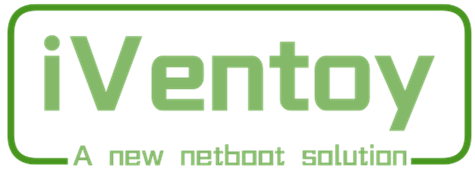iVentoy Auto Installation
Many distros provide unattended deployment solution. You just need to give a script or template for the installation.
For example, unattend xml for Windows, kickstart script for Redhat/CentOS, autoYast xml for SUSE, preseed script for Debian and so on.
In normal case, if you want to make an unattended deployment, you need to recreate a new iso file based on the original iso file, and add the
script or template into the new iso file.
With iVentoy you don't need to recreate a new iso file, just use the original one. You just specify a script or template for an ISO file in iVentoy GUI and that's all.
You can specify more than one scripts for an iso file at a time, iVentoy will provide a menu to choose before boot.
You can also update these scripts whenever you want.
- Supported Distros (Updating)
The example scripts are in the user/scripts/example directory of the software.
| Distros | Template | Example | Notes |
|---|---|---|---|
| Windows | Unattend XML | unattended.xml | Windows |
| Deepin/UOS | INI | deepin.ini | Deepin/UOS |
| RHEL8/CentOS8 | Kickstart script | kickstart8.cfg | Distros based on them are also supported. For example OpenAnolis, RockyLinux |
| RHEL7/CentOS7/Fedora | Kickstart script | kickstart7.cfg | Distros based on them are also supported. For example Oracle Linux, EuroLinux ... |
| RHEL6/CentOS6 | Kickstart script | kickstart6.cfg | Distros based on them are also supported. |
| openEuler | Kickstart script | openeuler.cfg | openEuler |
| Debian | Preseed script | preseed.cfg | Debian |
| Ubuntu Server (< 20.x) | Preseed script | preseed.cfg | Earlier Ubuntu Server Edition |
| Ubuntu Server (20.x+) | cloud-init | cloud-init-user-data | Ubuntu Server 20.x+ |
| SUSE | autoYast XML | autoYast.xml | SLES and openSUSE |
Attention! The sample script here is just for reference. You need to modify it for your hardware enviroment, especially the configuration for disk partition.
- Configuration
Select the corresponding ISO file on the iVentoy WEB GUI, and set the auto installation script path.
- Variables Expansion
When we do auto installation, there are some configurations in the installation script that cannot be fixed and hard-coded. The most common is the disk name or disk id.
For example, we set DISK0 or /dev/sda in the auto installation script file, but in some computer,
it is not the right disk we want.
So this may install the OS to the wrong disk.
So iVentoy supports Variables Expansion in the auto installation script.
The variables must be in $$VT_XXX$$ format (VT_XXX is the variables name).
Attention:
1. The auto installation script which contains variables must be in UTF-8 encoding.
2. Only variables in the following table are supported.
3. iVentoy will automatically check whether the installation script contains variables or not.
4. Variables expansion will not modify the original installation script file.
| Variables | Example | Description |
|---|---|---|
VT_MAC_COLON_LOWER |
11:22:33:aa:bb:cc | Client MAC address |
VT_MAC_COLON_UPPER |
11:22:33:AA:BB:CC | Client MAC address |
VT_MAC_DASH_LOWER |
11-22-33-aa-bb-cc | Client MAC address |
VT_MAC_DASH_UPPER |
11-22-33-AA-BB-CC | Client MAC address |
VT_SERVER_IP |
192.168.100.100 | iVentoy Server IP address |
VT_LOCAL_IP |
192.168.100.200 | Client IP address |
VT_NET_MASK |
255.255.255.0 | Subnet mask |
VT_NET_MASK_LEN |
24 | Subnet mask len |
VT_GATEWAY |
192.168.100.1 | Gateway address |
VT_HTTP_PORT |
16000 | iVentoy HTTP port |
VT_NBD_PORT |
10809 | iVentoy NBD port |
VT_IMG_ID |
2 | IMAGE ID。 |
VT_IMG_PMD5 |
68c033b63073f1c57ea95a80dacfb887 | IMG PMD5 |
VT_IMG_ID_HTTP_URL |
http://192.168.100.100:16000/eiso/id/1 | URL for ISO internal files (IMGID), refer: iVentoy HTTP URL |
VT_IMG_PMD5_HTTP_URL |
http://192.168.100.100:16000/eiso/ pmd5/68c033b63073f1c57ea95a80dacfb887 |
URL for ISO internal files (IMG PMD5), refer iVentoy HTTP URL |
VT_WINDOWS_DISK_1ST_NONUSB |
1 | The first non-USB disk. According to the disk ID in Windows and can only be used in Windows unattend.xml. |
VT_WINDOWS_DISK_MAX_SIZE |
1 | The disk with the largest capacity. According to the disk ID in Windows and can only be used in Windows unattend.xml. |
VT_WINDOWS_DISK_CLOSEST_XXX |
2 | The disk whose capacity most closest to XXX GB. The XXX must be replaced with a specific value, for example VT_WINDOWS_DISK_CLOSEST_300 means the disk most closest to 300GB. Can only be used in Windows unattend.xml. |
VT_LINUX_DISK_SDX_1ST_NONUSB |
sdb | The first non-USB disk in sda sdb sdc ... Only check disks whose name is sdX. Other disks whose name like hda/vda/nvme0n1 are not checked. Can only be used in Linux installation script. |
VT_LINUX_DISK_MAX_SIZE |
sdc | The disk with the largest capacity. Not limited to disks in sdX, all disks will be checked (e.g. hdX/vdX/nvmeX...). Can only be used in Linux installation script. |
VT_LINUX_DISK_CLOSEST_XXX |
sda | The disk whose capacity most closest to XXX GB. The XXX must be replaced with a specific value, for example VT_LINUX_DISK_CLOSEST_300 means the disk most closest to 300GB. Not limited to disks in sdX, all disks will be checked (e.g. hdX/vdX/nvmeX...). Can only be used in Linux installation script. |
Example: unattend.xml

Example: kickstart.cfg

